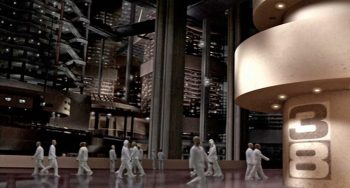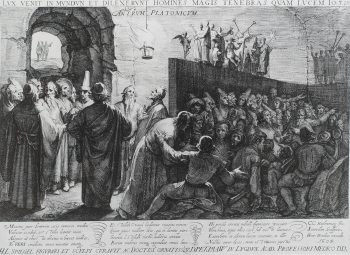This 1971 Sci-Fi film serves as a confusing depiction of a dystopian future that is as daunting as it is enthralling. Those who have not watched the film may be encouraged to do so because it is the first film directed by George Lucas.
Once a person knows this, it becomes easier to draw the connections between the themes and aesthetics of THX1138 and the Star Wars franchise.
From the dystopian overtones to the rebellious underground rising to overthrow the tyrannical forces that oppress them to the triumph of nature over technology, THX1138 can be seen as the blueprint for what Lucas would follow in creating the cultural juggernaut that we now know as Star Wars.
THX1138 is a film whose story is not overly complex, and it is because of this that I will outline the story while also making it clear that my intent behind this review is to discuss other aspects- aside from the narrative- that affirm the film’s themes and underlying messages.
The film takes place in a dystopian future that outlaws sexual intercourse and reproduction. This state enforces the use of mind-altering drugs to sedate its citizens into robotic, apathetic servitude. All inhabitants of the state wear white uniforms, are shaved bald, and are assigned mandatory letters and numbers as names.

The plot kicks into action when LUH3417, a woman working in a video control Centre- used to monitor the citizens of the state- begins swapping her roommate’s- the titular character THX1138- mandatory drugs for something else that does not have the same mind-numbing effects as his intended ones do.
THX- as a result of this- begins experiencing sensations that are alien to him. These include things like anxiety, nausea, and sexual desire. He goes to confession, where he tries to communicate his worries to an artificial image of a Christ figure, in which he is patronised by an artificial voice declaring him a: ‘True believer’ and saying a prayer, asking for: ‘Blessings of the state, blessings for the Masses’, and encouraging THX to: ‘Work hard, increase production, prevent accidents, and be happy’.
THX’s feelings soon override him when he develops a romantic connection with his roommate LUH3417, culminating in sexual intercourse, the ultimate act of defiance in this dystopian world. THX is soon arrested by the police for his transgression and sent to be re-institutionalised by the state to be an efficient worker again.
The film then follows THX as he escapes from the clutches of the state, not knowing where exactly he is fleeing to but knowing for sure what he is fleeing from. And that is an oppressive state that suppresses the human instinct at its most visceral and uncontrollable. The end sequence of the film is particularly interesting for many reasons- that will be elaborated on in a little while- where THX is beginning to climb a ladder out of the pit of the underground city he has been submerged in his whole life.
The police officers in pursuit tell him that if he climbs out of the pit, they won’t be able to go after him anymore. This emboldens THX from climbing out of the city. The film ends with THX emerging out of the pit, just in time to experience the sun setting.

Lucas’s seminal work jarred audiences, critics, and executives when it was released in 1971. Mainly because there was not much to go off of. So many questions about the story, the setting, and the characters were unanswered, either by the film or the promotional material leading up to its release.
But in the five decades since its release, the film’s themes have started to become clear and will become eerily clearer as time continues.
THX1138 is a film whose themes of totalitarian control, suppression of human individuality, and censoring of the human instinct for spontaneity resonates with audiences, sadly because of how much society seems to be sleepwalking into circumstances that run parallel with those of the film.
THX1138 does an excellent job of creating a city that is so built up that one cannot precisely see any exits or ways out of the dystopian underground. Its monochromatic landscape and style of dress make it sadly an uninteresting film to look at from an aesthetic point of view. Still, it does add to that feeling you have when watching the film that you are watching prisoners rather than citizens.
There are bursts of colour in the film, but its largely monochromatic colour scheme has an effect that irritates the viewer, giving way to a need to see a world of colour and vigour, not one that is drab and bleak.
THX1138- for those interested in philosophy- serves as a homage to the ‘Plato’s Cave’ scenario. The Greek philosopher paints a picture of enlightenment through the example of three men in a cave who are shown terrifying images (the shadows of them more precisely) until one of the three men breaks free, where, once he escapes the cave, he realises that the images of terrifying creatures he was forced to stare at are just that, images, the creatures were not accurate.

The man leaves the cave and basks in the sun’s light- even though the light hurts him because he has never experienced the sun before- he goes back to tell the other prisoners, but they label him a fool and a maniac, choosing to stay in submission.
This small metaphor about the enlightenment of the human being as told by a philosopher from Ancient Greece was re-packaged into an eighty-minute sci-fi film that was intended to warn the human being of the bleak road that our modern societies were travelling down and what blind compliance could do in terms of inviting that society in.
No one understood this more than George Orwell, author of the dystopian masterpiece 1984, who, in the final years of his life, left the world with this succinct warning: not to nation-states, religions, or special interest groups, but to humanity as a whole:
‘In our world, there will be no emotions except fear, rage, triumph, and self-abasement. The sex instinct will be eradicated; we shall abolish the orgasm. There shall be no loyalty except loyalty to the party, but always, there will be the intoxication of power; always, at every moment, there will be the thrill of victory—the sensation of trampling on an enemy who is helpless. If you want a picture of the future, imagine a boot stamping on a human face forever. The moral to be drawn from this dangerous nightmare situation is a simple one: don’t let it happen… it depends on you.’
THX is a film that consolidates different interest groups, bringing together cinephiles, the politically conscious, the philosophically inclined, and the free-spirited, who have looked at the world around them- quite apropos given the world in 2024, i.e. the re-election of Trump, the conflicts between Israel and Palestine, Russia and Ukraine, the climate crisis, and the decline of spirituality- and wondered what a world free of overbearing governance by the political elite could look like, and what kind of effort it may take to achieve liberation.
A liberation that is political, mental, and spiritual.

